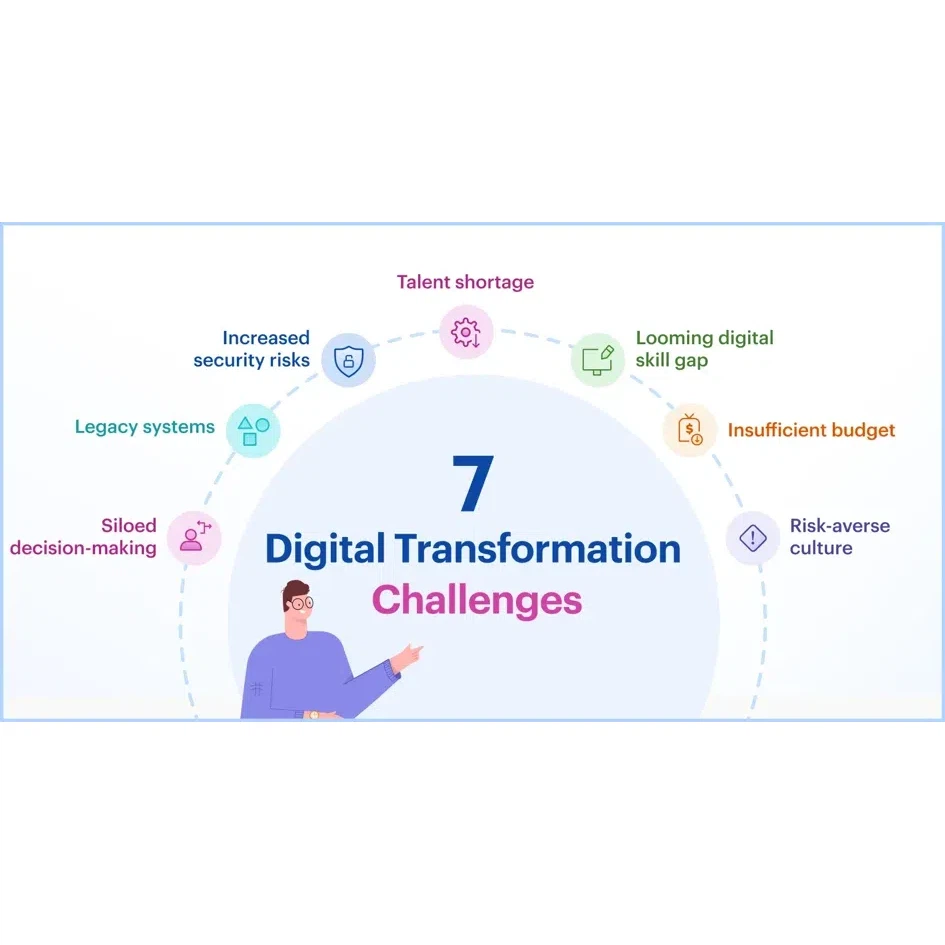Seven Key Challenges Inhibiting Digital Acceleration: Unlocking the Path to Transformation

In today's rapidly evolving digital landscape, organizations face the imperative to embrace digital acceleration to stay competitive and thrive. However, numerous challenges often hinder the progress and success of digital transformation initiatives. In this blog, we will explore seven key challenges that organizations encounter on their digital acceleration journey and discuss strategies to overcome them, ultimately unlocking the path to successful transformation.
1. Legacy Systems and Infrastructure:
One of the primary challenges organizations face is the burden of outdated legacy systems and infrastructure. These systems, often built over time, lack the agility and scalability required for digital acceleration. Modernizing and integrating these systems while minimizing disruption is crucial. A strategic approach that includes assessing current infrastructure, adopting cloud-based solutions, and leveraging APIs can help overcome this challenge.
2. Cultural Resistance and Change Management:
Digital transformation requires a cultural shift within organizations. Resistance to change, fear of job displacement, and lack of digital fluency can impede progress. Leadership must foster a culture that embraces innovation, encourages collaboration, and invests in upskilling employees. Open communication, training programs, and change management strategies are essential to address cultural resistance effectively.
3. Data Silos and Integration:
Data is the lifeblood of digital transformation. However, organizations often struggle with data silos, where information is scattered across different systems and departments. Breaking down these silos and integrating data sources is crucial for gaining comprehensive insights and enabling data-driven decision-making. Implementing robust data governance practices and utilizing advanced analytics tools can help organizations overcome this challenge.
4. Cybersecurity and Data Privacy:
With digital acceleration comes an increased risk of cyber threats and data breaches. Organizations must prioritize cybersecurity and data privacy to protect their assets and maintain customer trust. Establishing robust security measures, conducting regular audits, and investing in employee education and awareness programs are vital steps in mitigating these risks.
5. Talent Acquisition and Retention:
The demand for digital skills often outpaces supply, making talent acquisition and retention a significant challenge. Organizations must adapt their recruitment strategies to attract individuals with relevant digital expertise and provide ongoing training and development opportunities to retain existing talent. Collaborating with educational institutions and fostering a culture of continuous learning can help address this challenge.
6. Customer Experience Transformation:
Digital transformation goes beyond internal operations; it extends to enhancing the customer experience. Organizations must understand customer expectations and preferences to deliver personalized, seamless digital experiences. Utilizing customer analytics, implementing omnichannel strategies, and leveraging emerging technologies like artificial intelligence can help organizations transform the customer experience effectively.
7. Regulatory and Compliance Issues:
In an increasingly regulated digital landscape, organizations must navigate complex regulatory frameworks while ensuring compliance. Failure to do so can result in legal repercussions and damage to reputation. Staying informed about evolving regulations, partnering with legal experts, and implementing robust compliance frameworks are essential for overcoming this challenge.
Conclusion:
Digital acceleration is critical for organizations to stay competitive and thrive in today's digital age. By addressing and overcoming the key challenges inhibiting digital transformation, organizations can unlock the path to successful and sustainable transformation. Embracing a strategic approach, fostering a digital-first culture, investing in talent and technology, and prioritizing customer-centricity will pave the way for organizations to harness the full potential of digital acceleration and drive meaningful change.







